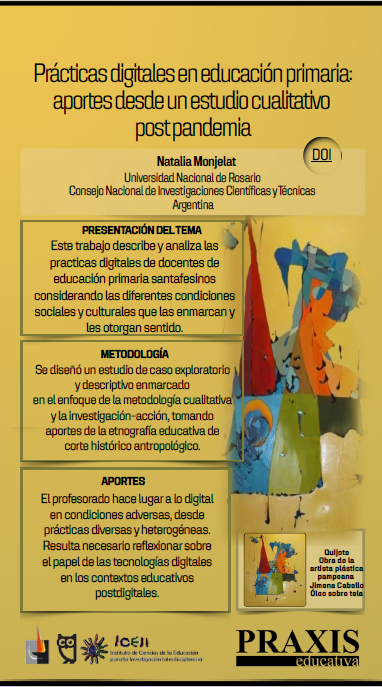Practicas digitales en educación primaria: Aportes desde un estudio cualitativo post pandemia
DOI:
https://doi.org/10.19137/praxiseducativa-2025-290215Palabras clave:
prácticas digitales, educación primaria, estudio cualitativo, herramientas culturalesResumen
Este trabajo tiene por objetivo describir y analizar las practicas digitales de docentes de educación primaria considerando las diferentes condiciones sociales y culturales que las enmarcan. A partir de un estudio de caso cualitativo centrado en escuelas primarias de gestión pública ubicadas al sur de la Provincia de Santa Fe (Argentina) y tomando aportes de la etnografía, se identificaron diferentes tensiones que permean la relación tecnologías-educación en los contextos estudiados. Los resultados visibilizan un conjunto diverso y heterogéneo de prácticas digitales docentes, que se desarrollan pese a no contar con políticas de acompañamiento, recursos tecnológicos idóneos o formación actualizada, que tienen lugar gracias al esfuerzo y dedicación del cuerpo docente que, en la adversidad, hace lugar a lo digital en sus aulas. Se destaca la necesidad de reflexionar sobre las problemáticas del escenario postdigital actual y el papel de las tecnologías digitales en los contextos educativos.
Descargas

Descargas
Publicado
Número
Sección
Licencia
Derechos de autor 2025 Natalia MONJELAT

Esta obra está bajo una licencia internacional Creative Commons Atribución-NoComercial-CompartirIgual 4.0.
Nota de copyright
Comité Editorial Revista Praxis educativa:
Por la presente declaro que soy autor del artículo titulado (nombre del artículo), que el mismo es original y propio y que no fue publicado en ningún otro formato o soporte con anterioridad. Manifiesto conocer que la revista no me cobrará ningún tipo de tasa bajo ningún concepto, ni recibiré ningún tipo de compensación monetaria
Si el mismo fuera aceptado para su publicación en Praxis educativa, autorizo a la referida revista a publicarlo en forma digital y a publicitarlo en sus redes sociales.
Si el trabajo fuera publicado, adhiero a la licencia Creative Commons denominada “Atribución - No Comercial Compartir igual CC BY-NC-SA”, mediante la cual se permite copiar, reproducir, distribuir, comunicar públicamente la obra y generar obras derivadas, siempre y cuando se cite y reconozca al autor original. Esta licencia se utiliza desde septiembre 2018. En 2016 se adhirió a CC BY NC ND 4.0; y en años 2017 y 2018 (enero -agosto) CC BY NC 4.0..
Esta licencia CC BY-NC-SA Compartir igual no permite, sin embargo, utilizar la obra con fines comerciales. Como autor la revista podré establecer acuerdos adicionales para la distribución no exclusiva de la versión de la obra publicada en la revista me permite el autoarchivo de los artículos publicados, en su versión post-print, en repositorios institucionales, temáticos, páginas web personales o cualquier otro uso pertinente. con el reconocimiento de haber sido publicado primero en esta revista.
Praxis educativa adhiere a DORA (Declaration on Research Assessment) firmada en San Francisco, California, el 16 de diciembre de 2012, y a la Declaración de México (Declaración Conjunta LATINDEX - REDALYC - CLACSO - IBICT).














_(1)2.png)


3.png)










_(2).png)






2.jpg)
8.png)









